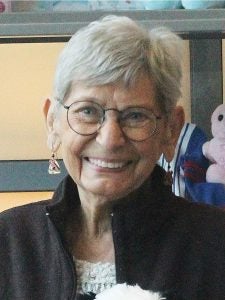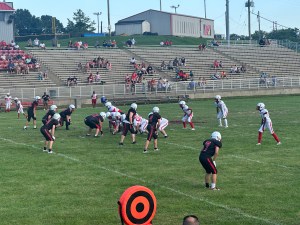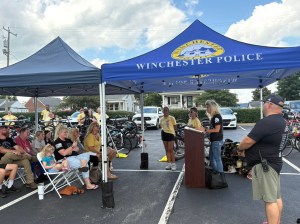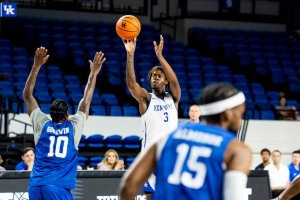A dose of hospitality: Hospital volunteers enhance patient care with thousands of service hours each year
Published 2:11 pm Saturday, October 28, 2017

- From left, Ruth Patton, Juanita Burkhart, Phyllis Hanks and Lorraine Hudson, are four of the more than 40 active members of the Clark Regional Medical Center Volunteer Auxiliary who provide a variety of services to patients from greeting them in the front lobby to helping them in the gift shop, reading to sick children, delivering warm blankets to emergency room patients and much more. (Photo by Whitney Leggett)
A trip to the hospital is not always a welcome experience.
Whether someone needs to be seen for a medical emergency or must wait several hours while a loved one has a surgical procedure, many times, visits to the hospital involve scary and uncomfortable circumstances on the part of patients and their families.
Other times, visits are for joy-filled families welcoming new life who need to be made to feel comfortable as they recover from labor or even an emergency delivery.
Trending
Whatever the reason, providing personal, attentive and quality patient care and customer service can make all the difference for a hospital’s visitors.
At Clark Regional Medical Center, that experience begins as soon as guests enter the building.
Seated at the welcome desk, and often clad in soft pink scrubs, are unpaid but critical members of the hospital’s staff.
Deemed “the face of Clark Regional Medical Center,” the CRMC Volunteer Auxiliary members help patients tin various ways at the hospital, starting with greeting visitors in the lobby.
“The members of the Volunteer Auxiliary are a very important part of our team,” Candice Tackett, director of patient experience at CRMC said. “They are the face of the hospital. They are the first people our patients and visitors see and come in contact with at the main building and at both of our clinic buildings.”
The role of a volunteer
Trending
In her role at CRMC, Tackett is responsible for working with hospital staff to improve customer service with the goal of “always putting the patient first.” She oversees complaints and comments from patients and conducts training about communication and empathy with nurses and doctors.
Her priority is to work with staff on providing compassionate, patient- and family-centered care. She said the volunteers at CRMC are as critical to the patient experience as any paid staff.
“The volunteers are the first impression for the facility, and they set the tone for each patient, family member or visitor’s experience,” she said.
Beyond the welcome desk in the hospital’s main lobby, volunteers also welcome patients to the two Clark Clinic facilities adjacent to the main hospital.
At these stations, volunteers help visitors find their way around the CRMC campus. Volunteers make calls to hospital staff to inform them a visitor is waiting, they direct patients to the proper areas of the hospital and help family members who are often scared or even grieving feel safe and comfortable as they visit their loved ones.
But the work of volunteers doesn’t stop there.
The role of the volunteers is centered on providing for patients, Tackett said.
“Volunteers round on patients, which includes visiting with patients who don’t have family, reading to children in the pediatric department, playing music for transitional care patients or bringing cups of water and warm blankets to emergency room patients,” she said. “On the clinic side, they offer free coffee and water to patients. They bring around snacks for lab patients and others.”
Volunteers also work as patient liaisons in the surgery waiting room, giving updates to anxious family members waiting. Others visit with patients receiving chemotherapy treatments at the infusion lab.
And for those looking to give something comforting or congratulatory to a patient, the volunteers also run the hospital gift shop — from ordering inventory to customer service. The profits from the gift shop fund the various ways the Auxiliary is able to give back to hospital, its patients and, ultimately, the community.
Giving back
That concern and compassion for others is evident in the various ways the Auxiliary is able to give back.
With the profits from the gift shop and money from several fundraisers each year, funds are created to help with the needs of the hospital, patients and other community organizations.
Some of that money comes in remembrance of an auxiliary member who has passed away, Tackett said.
Martha Shearer was a volunteer at the hospital since 1995. As a dedicated and active member, she served as the Auxiliary’s treasurer from 2004-2007. Her family requested donations to the auxiliary in her honor, which can be used to further the mission of the organization.
“Even though we are here for patient comfort, that’s our main function, we are also able to give back in other ways,” Auxiliary President Karl Blackwell said.
Each year, the Auxiliary provides scholarships for people pursuing medical careers at area colleges. Most recently, the group donated flowers and ornaments for the Walk to Remember to be given to families who lost children through pregnancy or infant loss.
Annually the Auxiliary donates to programs that provide Christmas gifts to children in need, and they have sponsored veterans’ flights to visit their respective war memorials in Washington, D.C., on Honor Flights.
“They have a fund for medication at the hospital,” Tackett said. “If a patient needs a medication but doesn’t have insurance, that fund can help them get what they need.”
A fund allotted for the hospital’s Center for Women and Babies purchased swaddling sleep sacks to help families provide a safe sleep environment for babies. Another fund for the infusion clinic bought hats, gloves and scarves for patients with cancer.
The hospital’s chapel renovations were funded by the group and one volunteer brings fresh flowers from her private greenhouse to greet guests at the front desk a few days a week
What is the auxiliary?
The Volunteer Auxiliary was founded in the 1970s to help augment the quality of patient care in Clark County.
Currently, there are about 40 active members of the auxiliary, working anywhere from three or four hours a month to nearly 40 hours a week, depending on the individual, Blackwell said.
He began volunteering at the hospital himself after retiring from East Kentucky Power Cooperative in 2011.
“I was looking for something I could do where I could put in a few hours a day,” he said.
Much like Blackwell, many of the volunteers are retirees and seniors who are looking to give back to the community and stay busy.
Monday through Friday, Blackwell said hospital staff and visitors can count on at least four volunteers working.
During the Auxiliary’s October meeting, it was reported that volunteers provided 825.5 hours of service in the hospital during September. So far, 7,033.5 service hours have been racked up in 2017 — that is nearly the equivalent of three full-time employees in a full-year’s time.
Even with all that, Blackwell said the Auxiliary could stand to see some membership growth.
“We could really use about 15 to 20 more people,” he said. “That has proven to be a real challenge. Many people don’t want to do this kind of work when they find out they won’t be getting paid.”
Even more challenging is finding younger generations of people to get involved.
Blackwell began volunteering when he was 61, and remains one of the youngest active members.
“A lot of our volunteers are in their 80s,” he said. “We had two volunteers who quit working the last year or so and they were in their 90s. We have some in their 90s who are still working.”
While an aging group presents some challenges — hearing difficulties, mobility issues and their own medical concerns — there are some great benefits.
“These people have such great hearts for the children and the other older folks especially,” Blackwell said. “They have good hearts because they have been through some tough times themselves. Some can sympathize with the people they are helping. Additionally, they have many years of work experience they bring to the table.”
The willingness of these individuals to give of their time freely well into their 70s, 80s and 90s speaks volumes about their character, Blackwell said.
“It speaks well of their hearts,” he said. “We’ve got some people that just have a huge heart for this work. We recently lost our treasurer (Martha Shearer, unexpectedly) and she was out here three or four days a week working on the books,” he said. “Another volunteers works the gift shop three or four days a week.
“They have a personal need to fill, but they also have a heart for others.”
Recruiting help
Tackett said the Auxiliary is always looking for ways to recruit new members of various interests and ages.
“We could use a lot more volunteers,” she said. “We really would love to see some younger people, maybe in their late teens or early 20s, who are interested in careers in the clinical field or are trying to decide if the hospital environment is good for them. This would be a great way for them to get that experience.”
Volunteers must be at least 18 or older and must go through an application process, which includes and interview and a background check. Orientation for volunteers includes learning the hospital code of conduct and policies.
“They go through the same pre-employment as our employees, including a TB skin test and immunization,” Tackett said. “Then they spend about a week orienting to the hospital before they start their volunteer position.
“We are looking for people who have good people skills. Someone who is compassionate and patient working with different populations of people. Someone dedicated to our customers — patients, families, vendors and community members.”
Beyond a general interest, Blackwell said he can find a place for anyone.
Some volunteers have backgrounds in the medical fields, others come from banking careers, some are homemakers and others managed power plants or other industrial careers.
“We’re just looking for someone who is interested in helping others,” he said. “I think you have to have a servant’s heart to do this work. We’re looking for a caliber of people who simply want to serve others. But we will take anyone who is willing to be active.”
Blackwell said while he is interested in including more students, he hopes to see more of what he considers young people — individuals in their 40s, 50s or 60s — who want to be involved.
Those interested in volunteering can contact Tackett at 737-8523.
Integral team members
Tackett said in the hospital setting, volunteers can see the impact they make each day.
“A lot of them have been volunteers for 15 or 20 years,” she said. “But they still show up each day excited to be here. They feel that the hospital is place they can help people see that they are making a difference. Every day they are able to do something that changes the lives of a patient and their family. It can be very rewarding.”
While the primary function of volunteers is patient care, their impact extends to the hospital staff and administrators.
DeEtta Blackwell, a member of the CRMC board of directors, said the volunteers are integral team members.
“The work the volunteers do frees up employees to do direct, hands-on care with patients and give the quality of care each patient deserves,” she said. “The volunteer programs enables the people at the bedside to take the time to do that.”
Seemingly small jobs add up to have a huge impact on the hospital, Tackett said.
“They have a great impact on the overall experience of our visitors,” she said. “They are the face of the hospital and they set the mood for how each visit will go. That adds a lot to how our customers, and on a larger scale, the community perceives the hospital.”
VOLUNTEER VOICES
Volunteer Auxiliary members talk about why they do what they do
Lorraine Hudson
For 12 years, Lorraine Hudson has been one of the smiling faces hospital visitors see at the welcome desk in the front lobby.

Lorraine Hudson
The mother, grandmother and former homemaker said she began volunteering at the hospital because of her passion for caring for others.
“I just wanted to help people,” she said. “I enjoy helping people, seeing that they get to where they need to be, greeting them with a smile and just making them feel comfortable.
“Nobody really wants to the come to the hospital for the most part. Either they are sick or someone they love is sick.”
Lorraine also takes an active role in creating a positive patient experience by sitting on the hospitals’ Patient and Family Advisory Council, which includes other members of the community.
“We look at the many different ways we can improve things from the patient’s perspective,” she said. “We might look at signage, read patient complaints or even talk with patients about how we can better serve them.”
Although she enjoys making others feel at ease in the hospital, volunteering is rewarding for Lorraine on a personal level.
“There are new challenges every day, but I enjoy being part of the group,” she said. “We’re like a family and that’s reason enough for me to keep coming back.”
Phyllis Hanks
Phyllis Hanks has been able to use her experience owning her business to run the hospital’s gift shop for 12 years.

Phyllis Hanks
As the gift shop manager, she is responsible for buying and displaying merchandise and helping customers in the store. The proceeds from these sales enable the Auxiliary to give back in other ways than time.
“The gift shop makes about 96 percent of the money that we use to donate to causes in the hospital and the community,” she said.
Phyllis spends three to four days a week at the gift shop and spends one of her days off making purchases for the store.
Hanks previously worked at Central Bank and owned her own store in Naples, Florida.
The Lexington native and longtime Winchester resident said she enjoys being able to impact patients through the gift shop.
“It makes me happy and it is very fulfilling,” she said. “We get to help people pick out a gift for new parents or give a gift for some other circumstance.”
While Phyllis enjoys the mission of giving good customer service, she said volunteering is also personally fulfilling.
“I receive more than I give,” she said. “There are many wonderful people I have met through volunteering that have become my good friends.”
Ruth Patton
When people visit then hospital gift shop in search of the appropriate gift for a loved one, Ruth Patton can typically be found operating the register.

Ruth Patton
Patton, a Winchester resident by way of Illinois and retired educator, has been volunteering with the Auxiliary for seven years.
“I was just interested in using my time to help others,” she said. “The gift shop offers a valuable service to the people who come here. Many are purchasing gifts that will be taken to patients and can hopefully make them happier while they are here.”
While Ruth said there is pressure to do a good job in such an environment as important as a hospital, she still enjoys the work.
“It just makes me feel good,” she said. “The friendship from the Auxiliary is just an added bonus.”
Juanita Burkhart
With 29 years of service, Juanita Burkhart is one of the Volunteer Auxiliary’s longest-serving members.

Juanita Burkhart
After nearly three decades, she remains active in the organization working in the gift shop about four hours each week and filling in when others need their shift covered.
“The best part is to get to see the smiles, to be able to know we helped make someone happy,” Juanita said.
After retiring from her job of 15 years at IBM, Juanita was looking for a way to stay active.
“I wanted to get out and still be with other people,” she said. “I enjoy the challenge of being able to really help others.”
In her time with the hospital, Juanita said she has seen many changes — whether through the Auxiliary itself, the hospital staff or even the facility.
“When we moved to the hospital, it seemed like everything changed,” she said.
One thing that didn’t change was the mission of the volunteers, though.
“We take a lot of work off the hospital employees,” she said. “Beyond just the gift shop, we help many other departments. It takes a load off the employees.”
And the networking among volunteers makes the job that much more rewarding.
“I love the work I do and I love the people I work with,” she said.
To learn more about how to volunteer at Clark Regional Medical Center, contact Candice Tackett, director of patient experience, at 737-8523.








